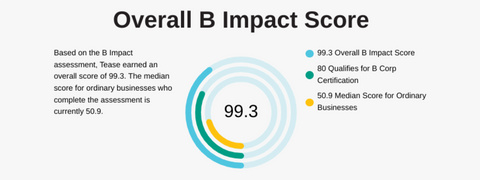B-Corp Month: Breaking Down Our Benefit Corporation Impact Score
We are proud to be Canada's first Certified Benefit Corporation tea company, certified since 2021!
If you're not yet familiar with Benefit Corporations, some of the most well-known businesses that are BCorp Certified include Patagonia, Ben & Jerry's, Eileen Fisher, Thrive Market and more.
Tease has been a business with a social impact model since its inception, however obtaining our BCorp Certification was important to us to help validate our efforts and policies while assuring to our stakeholders (that's you!) that we're committed to striving to meet the highest standards for environmental and social performance and impact.
The B Impact Assessment both audits and validates businesses with an Impact Business Model through a really vigorous and thorough series of (ongoing) audits. The assessment itself is measured across five focus areas: Governance, Workers, Community, Environment and Customers. The average business obtains a B Impact Score of 50.9, while a minimum score of 80 is required for a successful assessment.

Now, let's take a look at our Overall B Impact Score, and how we've scored in each of the five categories:
1. Governance

"Governance evaluates a company's overall mission, engagement around its social/environmental impact, ethics, and transparency. This section also evaluates the ability of a company to protect their mission and formally consider stakeholders in decision making through their corporate structure (e.g. benefit corporation) or corporate governing documents."
2. Workers

"Workers evaluates a company’s contributions to its employees’ financial security, health & safety, wellness, career development, and engagement & satisfaction. In addition, this section recognizes business models designed to benefit workers, such as companies that are at least 40% owned by non-executive employees and those that have workforce development programs to support individuals with barriers to employment."
3. Community

"Community evaluates a company’s engagement with and impact on the communities in which it operates, hires from, and sources from. Topics include diversity, equity & inclusion, economic impact, civic engagement, charitable giving, and supply chain management. In addition, this section recognizes business models that are designed to address specific community-oriented problems, such as poverty alleviation through fair trade sourcing or distribution via microenterprises, producer cooperative models, locally focused economic development, and formal charitable giving commitments."
4. Environment

"Environment evaluates a company’s overall environmental management practices as well as its impact on the air, climate, water, land, and biodiversity. This includes the direct impact of a company’s operations and, when applicable its supply chain and distribution channels. This section also recognizes companies with environmentally innovative production processes and those that sell products or services that have a positive environmental impact. Some examples might include products and services that create renewable energy, reduce consumption or waste, conserve land or wildlife, provide less toxic alternatives to the market, or educate people about environmental problems."
5. Customers

"Customers evaluates a company’s stewardship of its customers through the quality of its products and services, ethical marketing, data privacy and security, and feedback channels. In addition, this section recognizes products or services that are designed to address a particular social problem for or through its customers, such as health or educational products, arts & media products, serving underserved customers/clients, and services that improve the social impact of other businesses or organizations."
Further Resources & Education
- Learn more about our BCorp Certification and Impact Assessment on the B Labs Website.
- Learn more about B Labs and their mission














